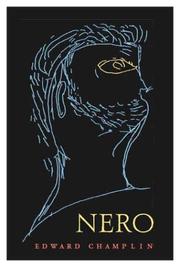| Listing 1 - 1 of 1 |
Sort by
|

ISBN: 0674011929 0674018222 9780674018228 0674029364 Year: 2003 Publisher: Cambridge ; London The Belknap Press of Harvard University Press
Abstract | Keywords | Export | Availability | Bookmark
 Loading...
Loading...Choose an application
- Reference Manager
- EndNote
- RefWorks (Direct export to RefWorks)
The Roman emperor Nero is remembered by history as the vain and immoral monster who fiddled while Rome burned. Edward Champlin reinterprets Nero's enormities on their own terms, as the self-conscious performances of an imperial actor with a formidable grasp of Roman history and mythology and a canny sense of his audience. Nero murdered his younger brother and rival to the throne, probably at his mother's prompting. He then murdered his mother, with whom he may have slept. He killed his pregnant wife in a fit of rage, then castrated and married a young freedman because he resembled her. He mounted the public stage to act a hero driven mad or a woman giving birth, and raced a ten-horse chariot in the Olympic games. He probably instigated the burning of Rome, for which he then ordered the spectacular punishment of Christians, many of whom were burned as human torches to light up his gardens at night. Without seeking to rehabilitate the historical monster, Champlin renders Nero more vividly intelligible by illuminating the motives behind his theatrical gestures, and revealing the artist who thought of himself as a heroic figure. Nero is a brilliant reconception of a historical account that extends back to Tacitus, Suetonius, and Cassius Dio. The effortless style and artful construction of the book will engage any reader drawn to its intrinsically fascinating subject. Table of Contents: 1. The Once and Future King 2. Stories and Histories 3. Portrait of the Artist 4. The Power of Myth 5. Shining Apollo 6. Saturnalia 7. One House 8. Triumph Epilogue Note on Sources Bibliography Notes Acknowledgments Illustration Credits Index Reviews of this book: A compelling reevaluation of an oft-maligned ancient figure who created his own myth out of the fabric of his life.--Publishers WeeklyReviews of this book: Champlin's Nero.is a compelling reminder that historical 'truth' is usually [much] more complex and elusive than we realize and that history is rarely written without bias or hidden motives, conscious or otherwise. You will not love Nero any more after reading Champlin's account of him, but you will have a far keener understanding of him, and his context, than you likely had before.--Jonathan Yardley, Washington Post Book WorldReviews of this book: Ignoring Nero's political activities almost entirely, Champlin argues that Nero saw himself first and foremost as an artist, a sort of Oscar Wilde figure whose love of theatricality dominated his life.Champlin judges Nero to have been an artist, aesthete, showman and PR man of considerable talent, ingenuity and energy, who understood what the people wanted to see--and this, he concludes, accounts for Nero's remarkable afterlife. Whether one believes that conclusion or not, Champlin's brilliant interpretation of Nero's stage activities strike's me as an important advance in our understanding of what drove that dreadful man.--Peter Jones, Sunday TelegraphReviews of this book: Nero is an excellent read, an atmospheric retelling of the wonders and horrors of its fascinating subject. Champlin piles up contexts and materials to fill out the shorter accounts offered by ancient authors in an attempt to find meaning in Nero's extraordinary actions.It is vivid and exciting. Nero's world appears in a series of brilliant tableaux and the central character entrances as he horrifies.--Greg Woolf, Times Literary Supplement
| Listing 1 - 1 of 1 |
Sort by
|

 Search
Search Feedback
Feedback About
About Help
Help News
News